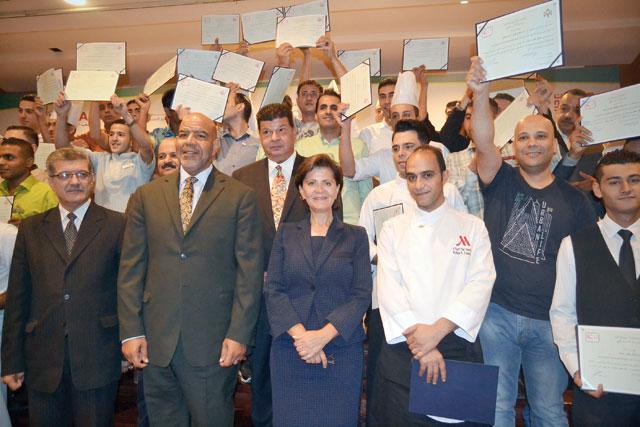You are here
USAID scheme helps improve quality, service of tourism industry
By JT - Nov 24,2014 - Last updated at Nov 24,2014

AMMAN — USAID on Monday joined the ministries of tourism and labour, the Vocational Training Corporation (VTC) and the Higher Education Accreditation Commission to mark the first successful milestone of the Pathways to Professionalism Scheme.
Recognising the critical workforce shortage in the tourism sector, USAID introduced this innovative scheme in 2012 to improve the quality and service of the tourism industry by building the capacity of hotels and restaurant managers, and their employees, according to a USAID statement e-mailed to The Jordan Times.
The initiative was piloted at the InterContinental Hotels Group (IHG), and on Monday, 57 employees at the hotel in Amman received their certification at a ceremony held under the patronage of Minister of Labour and Minister of Tourism and Antiquities Nidal Katamine.
“Pathways to Professionalism provides a special work-based training that enables hotel and restaurants to recruit, train and accredit their own workforce,” the statement said.
The 57 IHG employees represent a range of professions from kitchen, food and beverage service to housekeeping.
“For the hospitality-sector employees, this scheme is equally lucrative as it offers an opportunity to enhance knowledge and skills and become certified, thereby improving career growth possibilities,” the statement added.
In order to graduate, each trainee had to pass a practical test, a theory exam and an interview, which took place at the National Assessment Centre operated by the VTC in Madaba. Certificates are accredited and awarded by the VTC, according to USAID.
Speaking at the event, USAID Acting Deputy Mission Director John Dunlop noted that “over the next two years, it is estimated that 48 new hotels will be built in Jordan.”
“The 2011-2015 National Tourism Strategy for Jordan identifies a need for 6,300 new entrants to the tourism sector every year. The annual supply of prospective employees from colleges and other training institutions stands at an average of 2,500 graduates. To meet this great demand, it is clear that employees will need to be trained on the job and receive qualifications through the workplace,” the statement quoted Dunlop as saying.
“This is exactly what the Pathways to Professionalism Scheme is about,” he added.
Related Articles
AMMAN — A training academy was launched at the Dead Sea on Monday to address challenges faced by local communities within the Jordan Valley
AMMAN — Twenty-one hotels on Tuesday celebrated the graduation of the second batch of trainees from the “Pathways to Professionalism” progra
AMMAN — A new training programme launched Monday for workers in the hospitality industry will hone their skills and enhance quality of servi

















